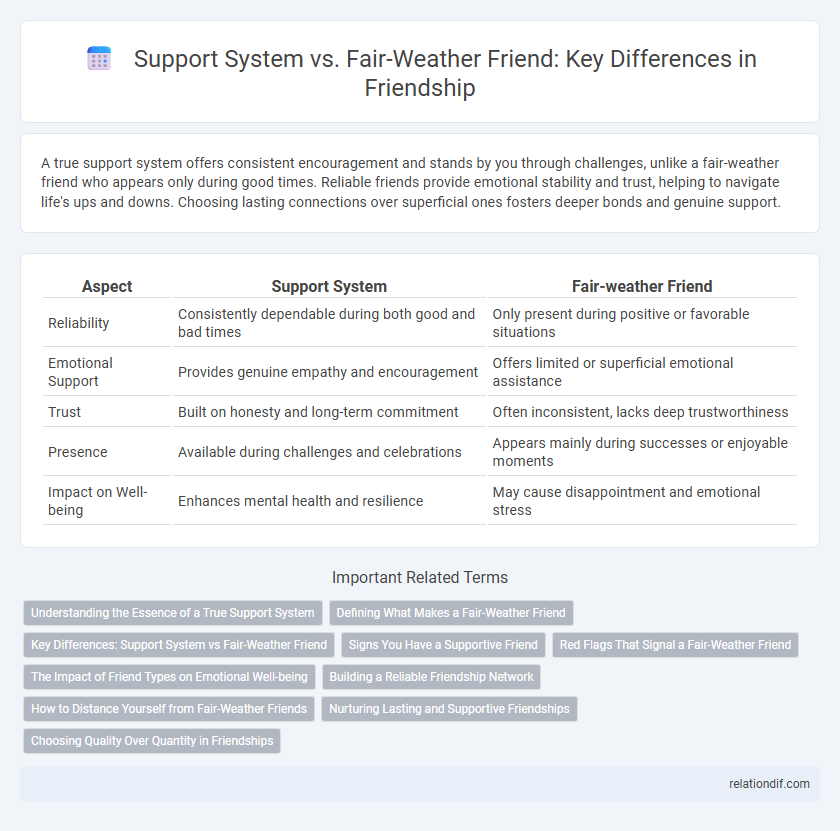A true support system offers consistent encouragement and stands by you through challenges, unlike a fair-weather friend who appears only during good times. Reliable friends provide emotional stability and trust, helping to navigate life's ups and downs. Choosing lasting connections over superficial ones fosters deeper bonds and genuine support.
Table of Comparison
| Aspect | Support System | Fair-weather Friend |
|---|---|---|
| Reliability | Consistently dependable during both good and bad times | Only present during positive or favorable situations |
| Emotional Support | Provides genuine empathy and encouragement | Offers limited or superficial emotional assistance |
| Trust | Built on honesty and long-term commitment | Often inconsistent, lacks deep trustworthiness |
| Presence | Available during challenges and celebrations | Appears mainly during successes or enjoyable moments |
| Impact on Well-being | Enhances mental health and resilience | May cause disappointment and emotional stress |
Understanding the Essence of a True Support System
A true support system provides consistent emotional backing and genuine care, standing firm during both successes and struggles, unlike fair-weather friends who appear only during favorable times. This dependable network fosters trust, empathy, and mutual growth, essential elements for long-lasting relationships. Recognizing the essence of true support highlights the value of loyalty and active presence in nurturing meaningful friendships.
Defining What Makes a Fair-Weather Friend
A fair-weather friend is someone who offers support only during good times but disappears when challenges arise, contrasting sharply with a reliable support system that provides consistent emotional backing regardless of circumstances. This type of friend lacks genuine commitment and is motivated by convenience rather than loyalty, often avoiding difficult conversations or situations. Identifying fair-weather friends involves recognizing patterns of selective availability and superficial engagement that undermine trust and long-term connection.
Key Differences: Support System vs Fair-Weather Friend
A support system provides consistent emotional encouragement, reliable advice, and long-term loyalty, crucial during both good and challenging times. In contrast, a fair-weather friend offers support only when circumstances are favorable or convenient, often disappearing during difficulties. The key difference lies in the dependable presence of a support system versus the conditional and sporadic involvement of a fair-weather friend.
Signs You Have a Supportive Friend
Supportive friends consistently offer encouragement during challenges and celebrate your successes without envy, demonstrating reliability and emotional investment. They listen actively, provide honest feedback, and prioritize your well-being over convenience, unlike fair-weather friends who appear only in good times. Recognizing consistent communication, empathy in difficult moments, and genuine interest in your growth are key signs you have a supportive friend.
Red Flags That Signal a Fair-Weather Friend
A fair-weather friend often shows inconsistent support, disappearing during challenging times and only reappearing when circumstances are favorable. Red flags include a lack of genuine empathy, unreliable communication, and prioritizing their own needs over mutual trust. True support systems demonstrate unwavering loyalty and consistently offer emotional stability even in adversity.
The Impact of Friend Types on Emotional Well-being
Support systems provide consistent emotional stability and resilience, significantly enhancing mental health by reducing stress and promoting a sense of belonging. In contrast, fair-weather friends contribute to emotional volatility, often triggering feelings of loneliness and mistrust during challenging times. Understanding the impact of these friend types is crucial for cultivating relationships that foster long-term emotional well-being and psychological security.
Building a Reliable Friendship Network
A reliable friendship network is built on consistent support, trust, and mutual understanding, distinguishing it from fair-weather friends who appear only during good times. Genuine support systems provide emotional stability, encouragement, and help during challenges, fostering long-term connections. Cultivating such friendships requires active communication, empathy, and shared experiences that strengthen bonds beyond superficial interactions.
How to Distance Yourself from Fair-Weather Friends
Recognizing a fair-weather friend involves noting inconsistent support during challenging times, which contrasts sharply with a reliable support system offering unwavering encouragement and trust. To distance yourself, set clear personal boundaries, limit interactions that drain your emotional energy, and invest in relationships that demonstrate mutual respect and genuine care. Prioritizing connections with loyal friends fosters emotional resilience and a healthier social environment.
Nurturing Lasting and Supportive Friendships
A true support system offers consistent empathy, understanding, and encouragement, fostering emotional resilience in times of hardship. Unlike fair-weather friends who appear only during good times, nurturing lasting friendships requires mutual trust, active listening, and genuine care. Cultivating these deep connections promotes long-term well-being and strengthened social bonds.
Choosing Quality Over Quantity in Friendships
A strong support system provides consistent emotional backing and trust, unlike a fair-weather friend who only appears during good times. Prioritizing quality friendships fosters genuine connections that withstand challenges, promoting long-term well-being and mutual growth. Choosing meaningful relationships over numerous acquaintances enhances resilience and personal fulfillment.
Support system vs Fair-weather friend Infographic

 relationdif.com
relationdif.com